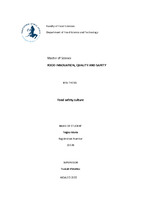| dc.contributor.advisor | Tsakali, Efstathia | |
| dc.contributor.author | Τσίγκα, Μαρία | |
| dc.date.accessioned | 2023-01-18T08:33:58Z | |
| dc.date.available | 2023-01-18T08:33:58Z | |
| dc.date.issued | 2022-09 | |
| dc.identifier.uri | https://polynoe.lib.uniwa.gr/xmlui/handle/11400/3606 | |
| dc.identifier.uri | http://dx.doi.org/10.26265/polynoe-3446 | |
| dc.description.abstract | Food safety is not the responsibility of one. It is addressed to every interested party in
the food chain. It is the result of the cooperation of their actions and the effective
implementation of the food safety management system.
Osman, 2018 stated that “By food safety culture, what is meant is a set of behaviours
that are learned and shared among people, and which are based on accepted
assumptions, values and beliefs, which are dynamically impacted by an array of factors
and situations”.
On 21st of March 2021, EFSA published the annex of 852/2004, (EU) 2021/382.
Through this regulation it becomes now mandatory to acquire food safety culture in
all organizations related to the food field and not only in those that are certified under
the umbrella of GFSI (BRC, IFS, FSSC).
The assessment of food safety culture in foodservice industry plays an integral role to
the improvement of existing food safety management systems. However, the research
to that aspect is still immature and little. Assessing food safety culture is of major
importance, in the sector of food industry. However, to date, there has been no in depth research on the subject.
With present research, an attempt was made to collect data and evaluate the current
situation in Greece, regarding the food safety culture of all stakeholders in the food
industry. For the needs of the research, a questionnaire of 25 questions was drawn
up, which was made available for anonymous completion via Google forms, for the
convenience of the participants. The required time to complete it was approximately
8-10 min. Subsequently, the statistical evaluation of this followed, through the
statistical program Minitab.
Τhrough the questionnaire, it is concluded that the majority of the participants are
experienced stakeholders from different backgrounds , which have received food
safety training.
What is more, most of the answers indicated that the majority of the stakeholders are
aware of the importance of food safety and have a high food safety culture. However,
it was observed a higher rating of food culture evaluation from the quality assurance
and management departments than from the general staff and production
departments.
In a general context, the current situation in Greece is at a satisfactory level in relation
to the food safety culture, nevertheless, there are some points for improvement such
as the fact that only 17.5% of the participants are rewarded for their participation in
the safe handling of food. | el |
| dc.format.extent | 86 | el |
| dc.language.iso | en | el |
| dc.publisher | Πανεπιστήμιο Δυτικής Αττικής | el |
| dc.rights | Αναφορά Δημιουργού - Μη Εμπορική Χρήση - Παρόμοια Διανομή 4.0 Διεθνές | * |
| dc.rights | Attribution-NonCommercial-NoDerivatives 4.0 Διεθνές | * |
| dc.rights.uri | http://creativecommons.org/licenses/by-nc-nd/4.0/ | * |
| dc.subject | Food safety | el |
| dc.subject | Food quality and safety | el |
| dc.subject | Food quality and safety management system | el |
| dc.subject | Food safety culture | el |
| dc.subject | Assessment of food safety culture | el |
| dc.subject | Food safety culture Greece | el |
| dc.title | Food safety culture | el |
| dc.title.alternative | Κουλτούρα ασφάλειας τροφίμων | el |
| dc.type | Μεταπτυχιακή διπλωματική εργασία | el |
| dc.contributor.committee | Tsaknis, John | |
| dc.contributor.committee | Λαμπροπούλου, Κυριακή | |
| dc.contributor.faculty | Σχολή Επιστημών Τροφίμων | el |
| dc.contributor.department | Τμήμα Επιστήμης και Τεχνολογίας Τροφίμων | el |
| dc.contributor.master | Καινοτομία, Ποιότητα και Ασφάλεια Τροφίμων | el |


